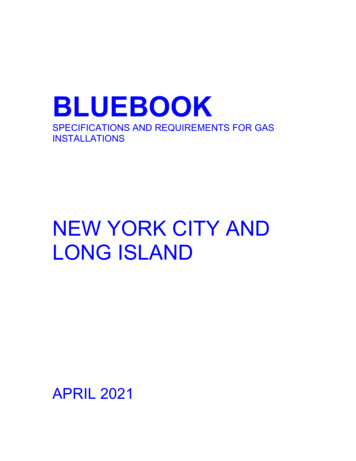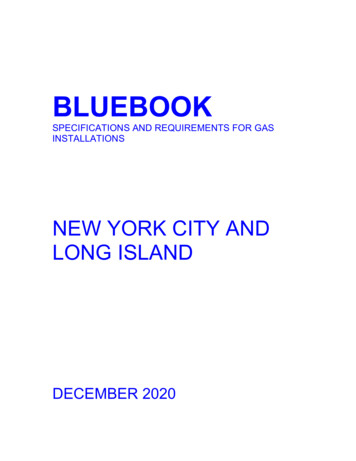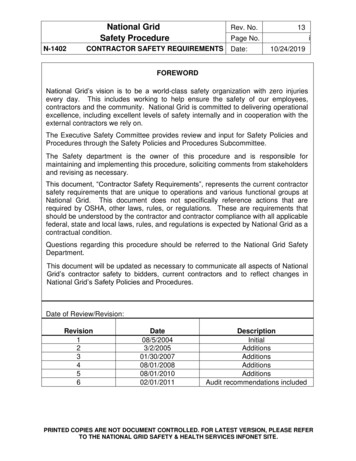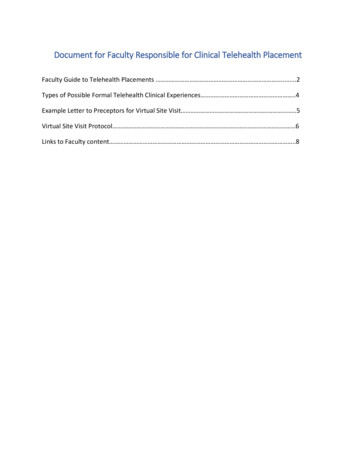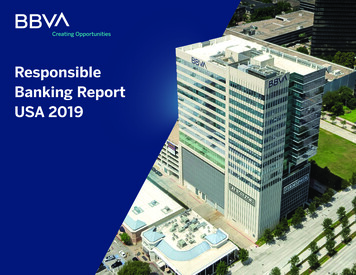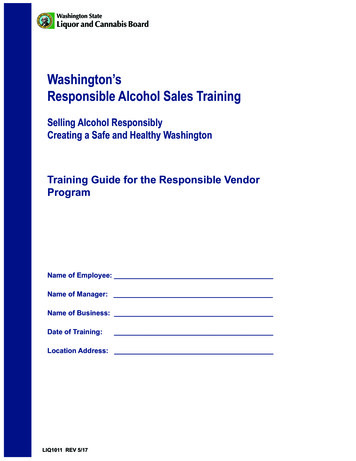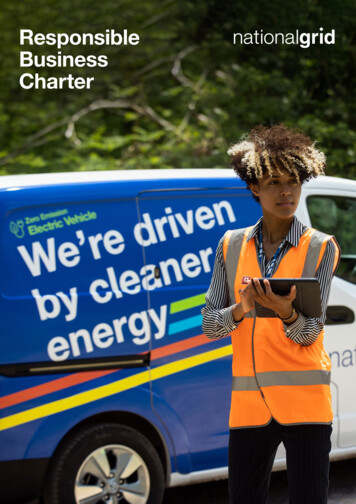
Transcription
ResponsibleBusinessCharter
National Grid Responsible Business Charter 2020Responsibility at National GridSociety’s expectationsSociety’s expectations of business and the rolebusiness plays in the world are changing. We sharethe belief that business needs to stand for somethingmore than profitability. Now, more than ever, we havea responsibility to demonstrate our contribution tosociety more broadly – whether that’s by makingsure young people today become the problemsolvers of tomorrow, or in tackling climate changeby reducing our own emissions and helping ourcustomers use energy more efficiently.John PettigrewChief Executive,National Grid PLCAt National Grid we’recommitted to beinga responsible businessin everything we do.It’s enshrined in ourpurpose – to BringEnergy to Life.We do this by delivering the electricity and gas thatour customers and communities rely on. We will alwaysdo this reliably, safely, and in a fair and affordable wayfor all. At National Grid, we apply responsibility as aprinciple every day, by doing the right thing, findinga better way and making it happen. Society expectsit of us, and we know we can make a positive impactin doing so.We are committed to shaping a sustainableeconomy for all, in partnership with others inour industry and beyond.Our responseResponsibility and transparency have always beenimportant to us at National Grid. In 2019, we lookedat where we can create the most positive impacton society. We adapted the way we manage ourbusiness responsibly, looking at everything fromour strategic investment process to our role in thecommunity and our business processes and policies.We applied this framework to shape our COVID-19response and showed that it is fit for purpose.To further our ambition, we are joining the B Team,a movement of global business leaders drivingbetter ways of doing business for the wellbeing ofpeople and the planet. The B Team principles ofsustainability, equality and accountability will informour actions and we will share our approachwith others.We support the United Nations SustainableDevelopment Goals (SDGs), focusing on the areaswhere we can make a material difference.Our charterThis charter is our articulation of what ‘responsibility’means for us at National Grid.We have identified where we can have the mostimpact on society: the environment, the communitieswe serve, our people, the economy, and ourgovernance. For each, we have set out commitmentsand how we will achieve them.We will report on our progress in our new annualResponsible Business Report beginning in 2021.*llcommitment dates refer to the end of thecalendar year. We will report on progress on afinancial year basis.*All commitment dates refer to the end of the calendar year. We will report on progress on a financial year basis.2
National Grid Responsible Business Charter 2020Our purposeBring Energy to LifeOur visionTo be at the heart of a clean,fair and affordable energy future.Our valuesEvery day we do the right thing,find a better way, and make it happen.Our responsiblebusiness approach01The environmentWe will enable a fair and affordable transition to a clean energy economy,and reduce our own emissions.Read moreon page 402Our communitiesWe will deliver sustainable energy safely, reliably and affordably,ensuring no one gets left behind.Read moreon page 803Our peopleWe will develop the right skills to enable and accelerate the energy transition,and strive to build a diverse workforce and inclusive culture.Read moreon page 1004The economyWe will power and heat society, and partner with regulators, our businesspartners, suppliers and other key stakeholders.Read moreon page 1205Our governanceWe will make sure our governance mechanisms reflect our commitments,and that the principles of responsibility guide us in everything we do.Read moreon page 143
National Grid Responsible Business Charter 2020The environment01 R esponsible businessin the environmentOur journey so farClimate change is the defining challenge of thisgeneration. The decisions we take now will influencethe future of our planet and life on earth. We mustmake significant changes to curb harmful emissions.Since 1990, we’ve reduced our direct (Scope 1 and 2)emissions by 70% (as at March 2020). That’s well inexcess of our interim target, which was 45% by 2020.But there is much more we can do.Most of the markets in which we operate haveannounced net zero carbon reduction targets,and we anticipate further legislation. We embracethe opportunity to play our role in helping achievethese challenging goals.Understanding our greenhouse gas emissionsScope 2: Indirect1Scope 3: IndirectUpstream Line losses from ourelectricity transmissionand distribution lines Energy purchased foruse at our facilities Use of electric drivecompressors in ourgas businessScope 1: Direct1Our operations Purchased goodsand services Business travel Employee commuting Long Island PowerAuthority electricitygeneration Leaks and ventingfrom our gastransmission anddistribution systems SF6 leaks from ourelectric equipment Fleet vehicle use Gas-firedcompressor use1Included in our net zero target.4Scope 3: IndirectDownstream Use of ‘sold product’or emissions from ourcustomers’ use of thegas and electricitywe purchase ontheir behalf Waste management
National Grid Responsible Business Charter 2020The environmentWhat we will doOur ambitions Accelerate our net zero target whereverpossible. We will work to achieve net zeroin each part of our business as fast as wecan. Where we need to pursue carbonoffsetting we will seek offsetting optionsthat deliver multiple benefits.Our commitmentsThis charter represents the next stage of ourenvironmental commitments, setting out asignificant change in what we will achieve. Achieve net zero by 2050. We will reduceScope 1 and 2 greenhouse gas (GHG) emissions80% by 2030, 90% by 2040, and to net zeroby 2050 from a 1990 baseline.2 Our Scope 1 and 2 target aligns to a well-belowtwo degrees pathway consistent with the ambitionrequirements of the Paris Agreement and ScienceBased Targets initiative (SBTi). Reduce Scope 3 GHG emissions for theelectricity and gas we sell to our customers(making up 80% of our Scope 3 emissions)by 20% by 2030 from a 2016 baseline. Our Scope 3 target aligns to SBTi's two degreespathway. With SBTi moving to only recognizetargets aligned to well-below two degrees and1.5 degrees, we will continue to work closelywith the team on this higher level of ambition,and work to have the Scope 1, 2 and 3 targetsofficially validated by the SBTi. Eliminate all SF6 gas from our assetsby 2050. Technology and solutions are not yetavailable to achieve this. Therefore, we will workwith partners from across the sector to identify,develop and implement SF6-free solutionsat the earliest opportunity. Further reduce our Scope 3 emissions fromselling gas to our customers beyond 2030 tobe consistent with the targets set by the marketsin which we operate (e.g. net zero by 2050). In the UK, the National Grid ESO (ElectricitySystem Operator) will be able to operatea zero-carbon system by 2025. Reduce SF6 emissions from our operations50% by 2030, from a 2019 baseline. Move to a 100% electric fleet by 2030 for ourlight-duty vehicles, and pursue the replacementof our medium- and heavy-duty vehicles withzero carbon alternatives. Reduce energy consumption in our offices20% by 2030, from a 2019 baseline. Improve the natural environmentby 10% on the land we own by 2030. Achieve zero carbon emissions frombusiness air travel. From this year (2020)onwards, we will reduce our annual air milestravelled by at least 50% from a 2019 baselineon an enduring basis, and we will offset anyremaining emissions responsibly.2Our interim 2030 target is science-based (80% by 2030 is the equivalent to 50% from a 2016 baseline).5
National Grid Responsible Business Charter 2020The environmentWe will enable a fair andaffordable transition to aclean energy economy, andreduce our own emissions.TransportThe decarbonization of transport. In a net zeroworld, almost all road transport will be decarbonized.We have a role to play here, making sure the rightcharging infrastructure is in place in the UK and USto enable an increase in electric vehicles.We will play a leading role in enabling andaccelerating the transition to a clean energysystem. The energy system will look very differentin a net zero world, and we will work to acceleratethe transition, while balancing decarbonization,affordability and reliability.We will also build electricity network flexibility andsupport low carbon alternatives, such as hydrogen,for heavy transport.Our aim is to be a leading utility globally indemonstrating the technical and commercial solutionsthat will help achieve net zero for the energy sector.Over 2020-21 we will work closely with the UKGovernment, Scotland and Wales, US partnersand partners around the world to demonstratethese solutions as part of work for COP263.ElectricityA fully decarbonized electricity grid. We expectdemand for electricity to rise as transport and someheat becomes electrified. To meet this demand, wewill connect renewables as quickly and efficiently aspossible, and invest in grid modernization. We will alsomake good use of demand-side management throughour energy efficiency and demand-side responseprograms in the US and UK.We will continue to build interconnectors to bringlow carbon energy to the UK, and we will grow ourrenewables business in the US. Our acquisition ofGeronimo Energy, a leading developer of wind andsolar generation assets, creates a solid foundationon which to develop and grow a large-scalerenewable business.HeatThe decarbonization of heat is uniquelychallenging; we’ll need to deploy cost-effectivesolutions for consumers and businesses, whileminimising disruption to people’s daily lives.While we don’t yet have the answers, we are surethere is no one-size-fits-all solution. We will workwith our customers and regulators to enablea range of potential solutions, including heat pumps,and renewable natural gas and hydrogen in ournetworks. In the US, we will continue leading onenergy efficiency and helping residential, commercialand industrial customers switch away from the mostpolluting heating fuels, such as oil.Natural gasNatural gas makes up a large proportion of ourown emissions. We’ll continue to reduce fugitiveemissions from our gas networks. In addition, ourLong Island generation fleet, which has already cutemissions substantially4, will transition to cleanersources of generation and storage, in line with NewYork’s climate goals5. We’ll also continue our role inhelping develop and deploy new technologies thathave the potential to help us decarbonize at scalein the years ahead – such as hydrogen networksand carbon sequestration.The UK is hosting the 26th UN Climate Change Conference in November 2021 in Glasgow.Our generation business has reduced emissions by over 80% since 1990.5New York has a goal of 100% clean generation by 2040.346
National Grid Responsible Business Charter 2020The environmentReducing our own emissionsWe’ll continue reducing our own direct emissions,replacing leak-prone gas pipelines with plastic ones,and by using robots traveling through our pipelinesto detect and reduce leakage. We are committedto replacing SF6 with cleaner alternatives, reducingSF6 emissions by 50% by 2030, and have setourselves an ambition to eliminate its use in ouroperations completely by 2050.Natural environmentWe must also address the challenge of restoringthe natural environment. Using our own land andworking with partners, we have an opportunity to cutcarbon and restore nature at the same time. We willimprove the natural environment on our own land;for example, by protecting habitats and increasingbiodiversity. We’ll do this by using best practicemethods, such as natural capital evaluation, so wecan make sure we create the most benefit. We’ll alsobuild on the work we’ve already done to increase theenvironmental value of more than 50 of our sites inthe US and UK.We will also reduce our business travel emissionsby changing to alternative fuel vehicles and reducingbusiness flights. We will encourage more flexibleways of working and use technology to reducebusiness travel, and incentivize our people tobuy electric vehicles. We will reduce the energyconsumed in our buildings and procure greenenergy where possible.We will achieve net zero emissions from our Scope3 construction activities in the UK by 2026. In theUS, we need to do more work to understand ourconstruction carbon intensity, but we will aim todevelop a target for reduction by 2022.To make sure we are making the right decisions,we’re implementing carbon pricing on all majorinvestment decisions by the end of 2020.WasteAdopting the principles of the circular economy, we’lldesign assets that can be recycled, refurbished andreused. We are committed to reducing the use ofsingle use plastics and sending zero waste to landfill,where possible, in our main offices.Improved air qualityWe will reduce NOx and SOx emissions byimproving the efficiency of our plant and equipment.Our initiatives to facilitate the electrification oftransport and reduce our own travel emissions willalso improve air quality in the areas we work.Our contribution to the UN SDGsWe support the United Nations SustainableDevelopment Goals (SDGs), which area universal call to action to end poverty,protect the planet and ensure all peopleenjoy peace and prosperity.Relevant UN SDGs for our environmentsfocused programs and actions:7
National Grid Responsible Business Charter 2020Our communities02 Responsible businessand our communitiesOur journey so farAs National Grid has evolved and grown in scale inthe UK and US, we have become part of the fabric ofthe communities we serve. We keep the lights on, wekeep them warm, we help economies thrive. We arean operator, an employer and a supplier. We supportour communities with the time and expertise of ourpeople, and through corporate giving programs.What we will doOur approach to responsibility in our communitieshas been to go beyond safely maintaining the resilientenergy systems society expects. It’s been aboutmaking sure our economic and social role in thecommunity has the greatest possible positive impact. Play our role in ensuring no-one is leftbehind in the transition to clean energy.The associated benefits should be enjoyed by all.That involves developing infrastructure and helpingcustomers use energy more efficiently. It also includespartnering with charity organizations, encouragingour people to support social, economic andenvironmental development.Helping our communities recover from the COVID-19crisis is a key part of this. We will contribute to a cleanand just recovery that will build a sustainable future forour communities.Our commitmentsWe will strive for affordability and fairness, and wewill develop skills for the future, with a focus onlower income communities. Deliver energy in a fair and affordableway to the communities we serve. Continue to reinvest in energy infrastructureat approximately 6.5 billion each year. Report transparently on energy coststhroughout the energy transition - on averagecosts per household for our UK transmissionnetwork and for our US electric and gas business. Develop skills for the future, with a focuson lower income communities, providingaccess to skills development for 45,000people by 2030. Through upskilling young peoplewith STEM6 skills, we will positively impact livesand help to grow the future energy workforceneeded to enable the energy transition. Achieve 500,000 employee volunteeringhours by 2030. Through volunteering,our people will help equip the next andfuture generations to participate in theclean energy transition.Our ambitions Play a meaningful role in the COVID-19recovery and enable people in ourcommunities to gain employmentin the clean and just recovery. Help customers reduce their energyusage through energy efficiencyprograms and education.6Science, technology, engineering and mathematics.8
National Grid Responsible Business Charter 2020Our communitiesWe will deliver sustainableenergy safely, reliably andaffordably, ensuring noone gets left behind.Education, employment and infrastructureWe will continue to apply a responsible businessframework to our investments in the communitieswe serve. This links our energy projects to localinfrastructure development, including affordablehousing. It will make sure the associated benefit ofmore accessible and affordable energy is enjoyedby those who need it most. We also place greatimportance on supporting communities througheducation and employment.We believe a strong community is good for thepeople who live there, good for our business andgood for the wider economy.As we look ahead, we know our communitiesneed and expect more from us. That’s why weare committed to upgrading our networks to providecleaner, greener and more affordable energy overthe long term.We will serve society fairly and affordablyWe want to make sure that the technological andenvironmental benefits the clean energy transitionwill bring are felt by all. Protecting vulnerablecustomers will remain a priority for us as we aimto make sure that no community is left behind– the energy transition represents a sharedchallenge and opportunity for us all.Throughout the transition, we have a role to play inhelping customers better understand and managetheir energy use – whether through energy efficiency,flexible load management or adopting cleansolutions like electric vehicles. Our aim is to helpthem reduce their carbon emissions and totalenergy costs.We will focus on the lower income communitieswe serve. We will aim to increase workforcediversity, and make sure the people mostin need benefit from our investment.We will listen and respondWe will continue to engage widely with thecommunities and customers we serve, respondingto their needs, minimizing disruption from ouroperations, and providing a service that satisfiesthem. Our overarching goal is to enhance thecommunities we serve.Our contribution to the UN SDGsRelevant UN SDGs for our communitiesfocused programs and actions:National Grid has been repeatedly acknowledgedas the number one utility for energy efficiency in theUS, and we will make sure lower income customersand communities get the benefit from more efficientenergy consumption.We will maintain reliabilityReliability and resilience of our networks are part ofour regulatory duty, but also our social contract. Aswe transition to an increasingly complex electricitysystem, managing intermittent renewables andtwo-way power flows, we will maintain customers’expectations for reliable energy.And, because of the effects of climate change, ournetworks will need to be more prepared to recoverfrom extreme weather events. We’re committed tomaking sure our systems are resilient and can playa leading role in disaster recovery.9
National Grid Responsible Business Charter 2020Our people03 Responsible businessand our peopleOur journey so farThe 23,000 people we employ in the UK and USare the lifeblood of our company. Their safety andwellbeing is a top priority for every one of us atNational Grid – it underpins everything we do.Our vision is to build and develop an inclusive cultureand a diverse workforce that is fully representative ofthe communities we serve. We treat everyone fairlyand equally, without discrimination on the grounds ofrace, age, role, gender, gender identity, color, religion,country of origin, sexual orientation, marital status,dependents, disability, social class or political views.This includes consideration for recruitment,redundancy, promotion, reward and benefits, trainingor retirement, all of which must be based on merit.What we will doOur commitments Be as transparent as possible internallyand externally on gender and ethnicity/race.
National Grid Responsible Business Charter 2020 The environment 1 Included in our net zero target. 4 Line losses from our electricity transmission and distribution lines Energy purchased for use at our facilities Use of electric drive compressors in our gas


